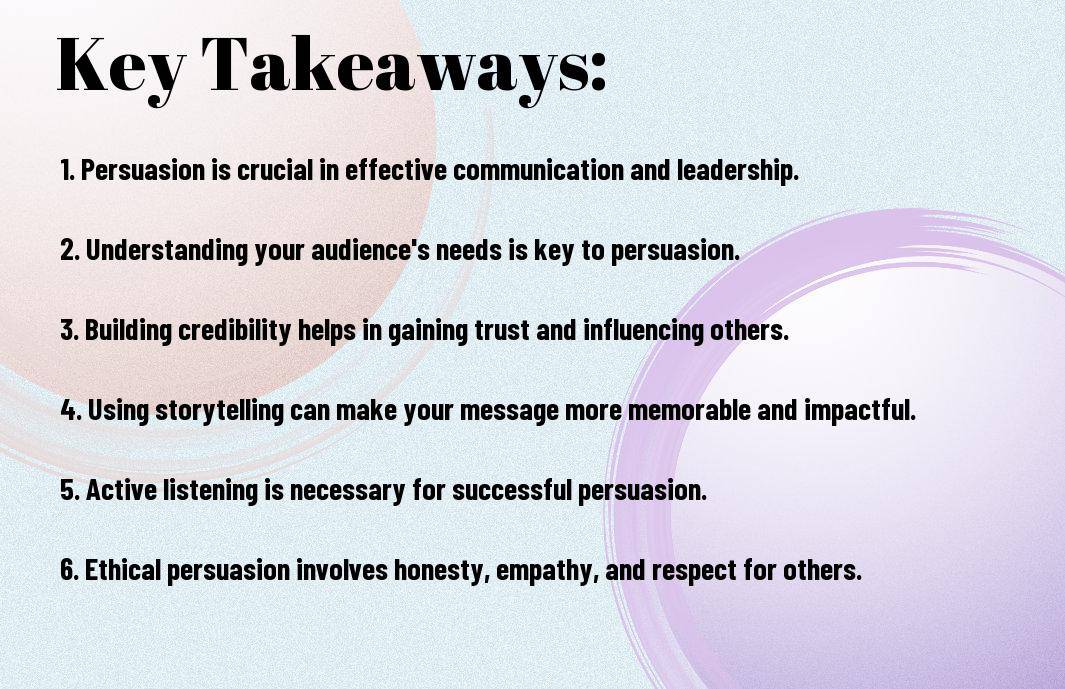
Newsletter Subscribe
Enter your email address below and subscribe to our newsletter

Enter your email address below and subscribe to our newsletter

The Power of Persuasion! Professionals in today’s fast-paced and competitive business world must possess crucial communication skills to succeed. One of the most crucial abilities for professionals to have is the power of persuasion. Being able to effectively persuade others can help professionals influence decisions, win over clients, and advance their careers.


Little do we realize the power of persuasion in our daily interactions – whether in the workplace, social settings, or even within ourselves. The ability to influence others’ thoughts, beliefs, and behaviors is a pivotal skill for professionals in all fields. Understanding the mechanisms behind persuasion can unlock new opportunities, foster stronger relationships, and drive positive outcomes.
On a psychological level, persuasion operates through various principles and techniques that tap into human cognition and decision-making processes. From the classic reciprocity principle to the scarcity effect and social proof, individuals can be swayed in subtle yet profound ways. By grasping these psychological triggers, professionals can tailor their communication strategies to resonate with their audience and achieve desired results.
Persuasion is a potent tool, but with power comes responsibility. Ethical considerations in persuasive communication are paramount to maintaining trust, integrity, and credibility. Professionals must navigate the fine line between influencing others and manipulating them. It is crucial to uphold strong ethical standards, prioritize honesty, transparency, and respect for the autonomy of individuals. Engaging in unethical practices can not only damage professional reputations but also harm relationships and undermine long-term success.

Unlike Persuasive Communication: Critical Thinking to Enhance …, the art of persuasion relies on several key pillars that can help professionals effectively communicate their message and influence others. These pillars serve as the foundation for successful persuasion strategies and can make a significant impact on your ability to sway opinions and drive actions.
For professionals seeking to enhance their persuasive communication skills, building credibility is necessary. Establishing yourself as a trustworthy and knowledgeable source can significantly impact how your audience perceives your message. By showcasing your expertise, experience, and integrity, you can instill confidence in your audience and increase the likelihood that they will be receptive to your ideas and recommendations.
The power of persuasion is often heightened by emotional connection and storytelling. Emotions play a crucial role in decision-making, and leveraging them can help you create a more compelling argument. Storytelling allows you to connect with your audience on a deeper level, making your message more relatable and memorable. By weaving narratives that evoke emotions and resonate with your audience, you can effectively capture their attention and influence their perceptions.
The ability to tap into emotions and craft engaging stories is a valuable skill that can set you apart as a persuasive communicator. Through personal anecdotes, compelling narratives, and impactful storytelling techniques, you can create a lasting impression and inspire action in your audience.
Credibility, logic, and reasoning form the backbone of persuasive communication. Presenting logical arguments supported by reasoning and evidence can help you build a strong case for your ideas and proposals. By employing sound logic and rationality, you can appeal to the intellect of your audience and persuade them based on the merits of your argument.
A mastery of logic and reasoning enables professionals to construct compelling arguments, anticipate counterarguments, and articulate their points effectively. By incorporating logical reasoning into your persuasive communication efforts, you can enhance your credibility and influence others with clarity and precision.
Once again, I invite you to Master the Art of Persuasion with Effective Communication to enhance your communication skills in the professional world. Language plays a crucial role in persuasion, as the power of word choice can significantly impact how your message is received.
Language is a potent tool in persuasion, as it can evoke emotions, establish credibility, and create a connection with your audience. By choosing your words carefully, you can influence others to see things from your perspective and take action. Whether it’s using strong, decisive language to convey confidence or employing vivid imagery to paint a compelling picture, your word choice can make all the difference in persuading others effectively.
On top of word choice, incorporating rhetorical devices and persuasive language techniques can further enhance your persuasive abilities. Rhetorical devices like analogies, metaphors, and similes can help simplify complex ideas, make your points more memorable, and capture your audience’s attention. By utilizing these techniques strategically, you can craft a more compelling and persuasive message that resonates with your listeners.
Plus, by mastering the art of persuasive language, you can influence decision-making, build rapport, and inspire action in your professional interactions. Understanding how to leverage rhetorical devices and persuasive language effectively can set you apart as a powerful communicator who can sway opinions and drive outcomes.
Nonverbal communication, which includes gestures, facial expressions, posture, and tone of voice, also plays a significant role in persuasion. Your body language can convey as much, if not more, information than your words. Whether it’s maintaining strong eye contact to exude confidence or using open gestures to convey openness and receptivity, your non-verbal cues can subtly shape how others perceive you and your message.
For instance, a firm handshake, steady gaze, and upright posture can signal professionalism, confidence, and trustworthiness, enhancing your persuasive impact in meetings, presentations, or negotiations.
For today’s professionals, effective communication skills are crucial for success in the workplace. One key component of communication that is often overlooked is the art of active listening. Active listening is not just about hearing what someone is saying, but truly understanding their perspective and feelings. It is a critical skill in building rapport, resolving conflicts, and ultimately persuading others to your way of thinking.
On the path to becoming a persuasive communicator, mastering the art of active listening is crucial. Some techniques for effective listening include maintaining eye contact, nodding to show understanding, paraphrasing the speaker’s words to confirm comprehension, and asking clarifying questions. By demonstrating a genuine interest in what the other person is saying, you can build trust and create a more open and receptive communication environment.
To truly persuade others, you must first understand their needs, concerns, and motivations. By actively listening to your audience, you can tailor your message to resonate with their values and beliefs. This not only enhances your ability to connect with others on a deeper level but also increases the likelihood of them being persuaded by your arguments. Listening is a powerful tool that can help you uncover hidden objections, address potential roadblocks, and ultimately guide others towards a mutually beneficial outcome.

Now, let’s investigate into the various contexts where persuasive communication plays a crucial role in achieving success. Whether in sales and marketing, organizational leadership and management, or negotiation and conflict resolution, the ability to persuade others is a valuable skill that can make a significant impact in professional interactions.
Persuasive communication in sales and marketing is imperative for building relationships with customers, influencing purchasing decisions, and driving business growth. Effective persuasion in this context involves understanding the needs and motivations of potential clients, tailoring messages to address their concerns, and presenting solutions in a compelling manner. By highlighting the benefits of products or services and addressing objections effectively, sales and marketing professionals can persuade prospects to take desired actions.
To inspire and motivate team members, leaders must possess strong persuasive communication skills. Whether it’s persuading employees to adopt a new strategy, aligning teams towards a common goal, or gaining buy-in for organizational changes, effective persuasion is imperative for successful leadership. By mastering the art of influence and persuasion, leaders can foster a positive work culture, enhance employee engagement, and drive organizational success.
Marketing
One of the most critical applications of persuasive communication is in negotiation and conflict resolution. Whether in business deals, resolving disputes, or managing conflicts within teams, the ability to persuade others to reach mutually beneficial outcomes is imperative. By employing persuasive techniques such as active listening, empathy, and effective communication, individuals can navigate challenging situations, build consensus, and achieve successful resolutions.
Keep honing your persuasive skills by understanding the importance of public speaking in business. Refer to my article The Power Of Persuasion: Why Public Speaking Is … for further insights on this critical aspect of communication.
Practice is important for enhancing your persuasive skills. Make it a habit to regularly engage in exercises that challenge your ability to communicate effectively. This could involve participating in debates, giving presentations, or even practicing in front of a mirror to work on your non-verbal cues. The more you practice, the more confident and persuasive you will become in your interactions.
One of the most crucial aspects of improving your persuasive skills is to actively seek feedback from others. Whether it’s from mentors, peers, or even through self-assessment, feedback provides valuable insights into areas where you can enhance your communication style. Additionally, engage in self-reflection to analyze your past interactions and identify areas for improvement. This introspective practice will help you understand your strengths and weaknesses, enabling you to refine your persuasive approach.
Self-reflection in the digital age involves utilizing various technology and multimedia tools to enhance your persuasive abilities. From recording your presentations to using software that analyzes your tone and body language, there are numerous resources available to help you fine-tune your communication skills. By incorporating these tools into your practice routine, you can gain valuable insights into how you can become a more persuasive communicator in today’s fast-paced business environment.
Skill up your persuasion game by integrating the latest technologies and multimedia tools into your practice sessions, enabling you to refine your communication style and deliver compelling messages that resonate with your audience.
Hence, mastering the art of persuasion is a crucial skill for professionals in today’s competitive world. It is vital for effective communication, building relationships, and achieving success in various aspects of life. By understanding the power of persuasion and practicing key techniques, individuals can influence others, inspire action, and advance their goals.
Therefore, professionals should continuously develop and refine their communication skills to enhance their persuasive abilities. By embracing the principles of persuasion, individuals can elevate their professional presence, cultivate stronger connections, and navigate through the complexities of today’s dynamic business environment with confidence and effectiveness.
A: Persuasion is the ability to influence others’ attitudes, beliefs, and behaviors. In professional communication, persuasion is crucial for convincing others, selling ideas, and building successful relationships.
A: To improve your persuasion skills, practice active listening, understand your audience, use compelling evidence and logical reasoning, and develop your emotional intelligence.
A: The key elements of persuasive communication include credibility, emotional appeal, logical reasoning, engaging storytelling, and understanding your audience’s needs and perspectives.
A: To build credibility in your communication, be knowledgeable about your topic, demonstrate integrity and honesty, show empathy towards your audience, and provide evidence to support your claims.
A: Emotional appeal can be used effectively in persuasion by connecting with your audience’s emotions, using storytelling to evoke empathy, and showing passion and enthusiasm for your message.
A: Body language plays a significant role in persuasive communication as it can enhance or detract from your message. Maintain eye contact, use open gestures, and pay attention to your posture to appear confident and trustworthy.
A: When facing objections and resistance, listen actively to understand the concerns, address them respectfully, provide additional information or alternative solutions, and remain calm and composed throughout the conversation.
The Science of Concentration in The Art of Focus